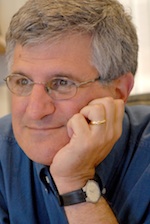How the Anti-vaccine Movement Threatens Us All
/ Paul Offit, MDIn his new book Deadly Choices: How the Anti-Vaccine Movement Threatens Us All pediatrican Dr Paul A. Offit traces the history of the anti-vaccine movement from opposition to the small pox vaccine in the 19th century up through recent events. Unfortunately, the results are predictable. Reducing vaccination rates lead to reemergence of dangerous preventable infectious diseases. That is why the decision not to vaccinate is not a personal decision. It is one that involves the whole community.
Paul Offit, MDIn his new book Deadly Choices: How the Anti-Vaccine Movement Threatens Us All pediatrican Dr Paul A. Offit traces the history of the anti-vaccine movement from opposition to the small pox vaccine in the 19th century up through recent events. Unfortunately, the results are predictable. Reducing vaccination rates lead to reemergence of dangerous preventable infectious diseases. That is why the decision not to vaccinate is not a personal decision. It is one that involves the whole community.
This is the focus of the conversation I had with Dr. Offit in Episode 40 of Books and Ideas. This is a follow-up to Dr. Offit's first interview here in Episode 25.
Because I think this issue is literally a matter of life and death, I encourage you to share this podcast with others.
Listen to Dr. Offit's interview (Books and Ideas #40)
Episode Transcript (Download PDF)
Subscribe to Books and Ideas Podcast: ![]()
![]()
![]()
![]()
Links and References
- Paul Offit, MD: Chief of the Division of Infectious Diseases and the Director of the Vaccine Education Center at the Children’s Hospital of Philadelphia
- Vaccines and Your Child: Separating Fact from Fiction by Paul A. Offit MD, Charlotte A. Moser
- Deadly Choices: How the Anti-Vaccine Movement Threatens Us All by Paul A. Offit M.D.
- Autism's False Prophets: Bad Science, Risky Medicine, and the Search for a Cure by Paul A. Offit
- Books and Ideas Episode 25: In this 2008 interview we talked about Offit's book Autism's False Prophets and our shared fears about the consequences of falling vaccination rates.
- van den Hof S, Conyn-van Spaendonck MA, van Steenbergen JE. Measles epidemic in the Netherlands, 1999-2000. J Infect Dis. 2002 Nov 15;186(10):1483-6. Epub 2002 Oct 29. During a measles outbreak that occurred in the Netherlands between 1990 and 2000 researchers found that fully vaccinated children living in communities with low rates of vaccination were at greater risk than unvaccinated children living in highly vaccinated communities.
- Brian Deer on Andrew Wakefield's conflicts of interest: "MMR:The Truth Behind the Crisis," Sunday Times (London), February 24, 2004.
- I mentioned two important court decisions made in 2009 and 2010 by the Omnibus Autism Proceedings. In 2009 the court ruled that there is no evidence that thimrosal-containing vaccines cause autism and in 2010 it ruled that there is no evidence that thimirosal alone causes autism. The complete docket of the Omnibus Autism Proceedings are available at http://www.uscfc.uscourts.gov/node/2718.
- All of Dr. Offits books (listed above) contain extensive references for those wishing to do more research.
- Jenny McCarthy Body Count: there were at least 662 deaths from vaccine-preventable diseases between June 3, 2007 and February 19, 2011.
Announcements
- Please feel free to share this podcast with others. Please contact me if you would like to use the interview-only in another podcast or for patient education.
- I have moved the Brain Science Podcast Discussion Forum to Goodreads.com and I have started a thread for discussing Deadly Decisions and Episode 40.
- I will be speaking to the London Skepticis in the Pub on May 11, 2010. Visit http://london.skepticsinthepub.org/ to learn more.
- Don't forget to join the Books and Ideas Facebook Fan Page.
- Leave reviews of Books and Ideas on iTunes® or wherever you get the podcast.
- Join me next month for a new episode of the Brain Science Podcast. The next episode of Books and Ideas will be posted in April, 2011.
Send email feedback to Dr. Campbell at gincampbell at mac dot com or leave voicemail at 205-202-0663.








 Paul Offit, MD
Paul Offit, MD













 Click here to visit Lee M Silver's website
Click here to visit Lee M Silver's website